COMMUNIQUE ON WEBINAR COMMEMORATING DAY OF THE SEAFARER 2021 THEMED “FAIR FUTURE FOR FEMALE SEAFARERS” ORGANISED BY THE FEMALE SEAFARERS ASSOCIATION OF NIGERIA (FESAN) IN COLLABORATION WITH WOMEN IN MARITIME JOURNALISM (WIMAJ) ON THURSDAY, JULY 15, 2021.
PREAMBLE
To mark the 2021 edition of the Day of the Seafarers, the Female Seafarers Association of Nigeria (FESAN) on Thursday, July 15, 2021 held a webinar on “Fair Future For Female Seafarers” in which the Honourable Minister of State for Transportation, Distinguished Senator Gbemisola Saraki delivered the keynote address. The event held in partnership with the Women in Maritime Journalism (WIMAJ). Koni Duniya, Founder and President of FESAN delivered the welcome address.
Moderated by Ezinne Azunna, Chairperson WIMAJ, Goodwill messages were received from the International Maritime Organisation (IMO) through Ms Helen Buni, its Principal Programme Assistant, Resource Mobilization and Partnerships, Technical Cooperation Division.
Others who delivered Goodwill Messages include Mr Temisan Omatseye, former President, African Shipowners Association (ASA) and the former Director General, Nigerian Maritime Administration & Safety Agency (NIMASA), Mrs Hope Orivri- Women in Maritime Journalism (WIMAJ), Hajia Bola Muse- President, Women in Maritime Africa (WIMA) Nigeria, Mrs Chizoba Anyika- Secretary WISTA Nigeria, Mr Emmanuel Maiguwa, President, Alumni of the Maritime Academy of Nigeria Oron (AMANO), Madam Obiageli Obi- former Director General, Nigerian Chamber of Shipping, Mrs Rollens Macfoy- MD Ocean Deep (a Crewing Agency), Mrs Chizoba Ejiofor-HR Starzs Investments amongst others.
Capt. Blessing Edidiong Abalo, the First Female Master Mariner in Nigeria, Capt. Sunday Umoren –Acting Secretary, Abuja MOU, Mr Henry Agbodjan- HR Manager NSML and Engr. Omeaku Glory, a certified female with 2nd Engineer onboard were members of the panel of discussants, who tackled the questions put out by the IMO to determined what a fair future would indeed mean for seafarers. In this case, the discussions were tailored to female seafarers in Nigeria.
Agencies, Industry leaders, technocrats, seafarers and other stakeholders attended the event.
OBSERVATIONS
From the presentations, including the Welcome Address by the President and Founder of FESAN, Koni Duniya, the Keynote address by the Honourable Minister of State for Transportation, the panel discussion, and the general contributions, the following observations emerged that:
- Female Seafarers deserve a Fair Future; FESAN is a support/empowerment, mentoring and advocacy platform for female seafarers in Nigeria
- The Pandemic threw open the critical roles seafarers play in facilitating global trade; The Pandemic showed that seafarers work under harsh conditions
- Deliberate Strategies guaranteeing a fair future of female seafarers are sparse, also neither implemented nor prioritised in Nigeria
- Out of 6039 seafarers registered in Nigeria, only 567 are females representing 9.3%of the entire seafaring population, only 304 of the 2041 Nigerian Seafarers Development Programme beneficiaries are females representing 14.5%
- There is a poor Implementation of policies that support maternity leave for female seafarers, thereby cutting short their career when they decide to start having offspring
- There are discriminations against female seafarers and gender inequality limits them from being mainstreamed
- Openings for female seafarers to settle into shore-based roles after their lives at sea will be valuable for inclusion in the industry and will contribute to growth;
- Digitalisation is the future of seafaring, especially for females it will close the perception of females not having the physical strength to work onboard the ship;
- Vessels in Nigeria are seldom built to accommodate female seafarers;
- Competence is the criterion for engaging seafarers as such training and capacity development for female seafarers needs to be prioritised;
- There is no collaborative efforts between Nigerian Maritime institutions and foreign flag state to promote the engagement of Nigerian cadets on international vessels;
- The NSML supports the Nigerian Seafarers Development Programme (NSDP) by the Nigerian Maritime Administration and Safety Agency (NIMASA)
- 19 female cadets from the NSDP/SCDP are currently undergoing sea training onboard NSML managed vessels and are considered to be ” very talented”;
- Female Seafarers have shown that they have enough physical energy for the work where required;
- More females are needed in shipping to ensure sustainability and drive effective decision making; Female Seafarers need more visibility to showcase their work and competence
- Few ship owning organisations have in-house policies that foster growth, visibility and accomplishments of female seafarers;
- Mentoring of younger females seafarers is necessary in the quest for a fair future;
- A safe and secure maritime domain will further encourage more females to join and thrive in seafaring;
- There is disrespect for female professionals due to cultural bias which insists on male supremacy;
- The is no fail-proof system for reporting and dealing with sexual harassments/molestation
RECOMMENDATIONS
Arising from the foregoing observations, these recommendations emerged, that:
- FESAN should pilot more engagements among female seafarer and stakeholders in the country necessary to decide measures and modalities for the increased women participation in the maritime sector
- Government should create specific opportunities such as encouraging quotas for females on vessels trading in Nigeria, training and development for women;
- NIMASA should increase its female training quota in the NSDP;
- Maritime industry stakeholders should review policies on pregnancy and maternity leave to ensure convenience for females working onboard vessels;
- Configuration of ships to accommodate females should be encouraged and employers can employ more females on the same vessel to minimise the challenge of cabin sharing;
- Female seafarers should also invest in self-development in preparation for opportunities they seek;
- Training of female seafarers on automation should be prioritised;
- More stakeholders should introduce and implement policies that support the growth and visibility of female seafarers;
- Nigeria should work towards having an all female crewed ship;
- Mutual Respect and Professionalism should be demanded from both genders working on board vessels and disrespect should be sanctioned;
- A system that decisively deals with sexual molestations on board vessels is required;
- Collaborations between indigenous maritime institutions and foreign flag state through accreditations can boost engagement of indigenous cadets by foreign vessels.
RAPPORTEURS
- Ezinne Azunna
- Joyce Okoli
- Esther Oluku

































































